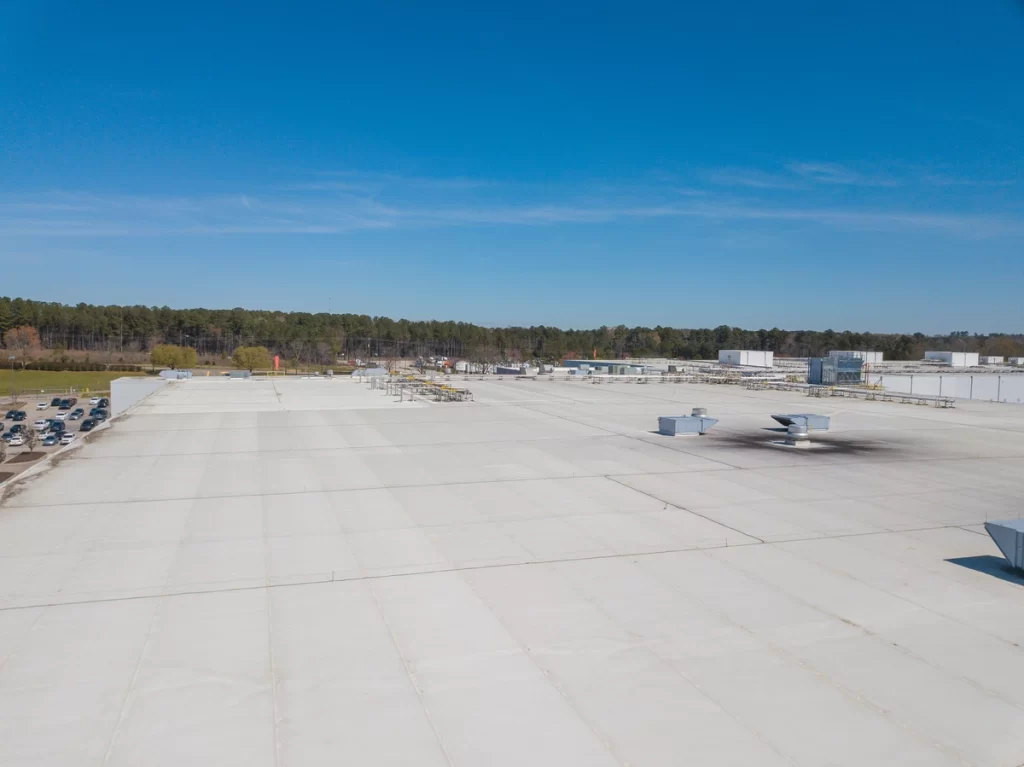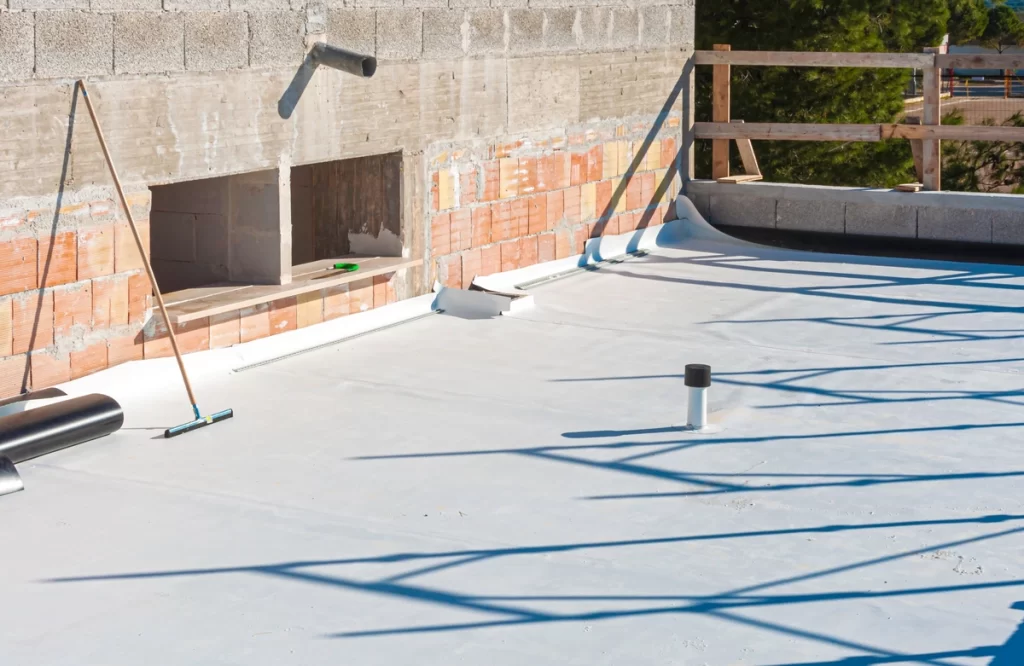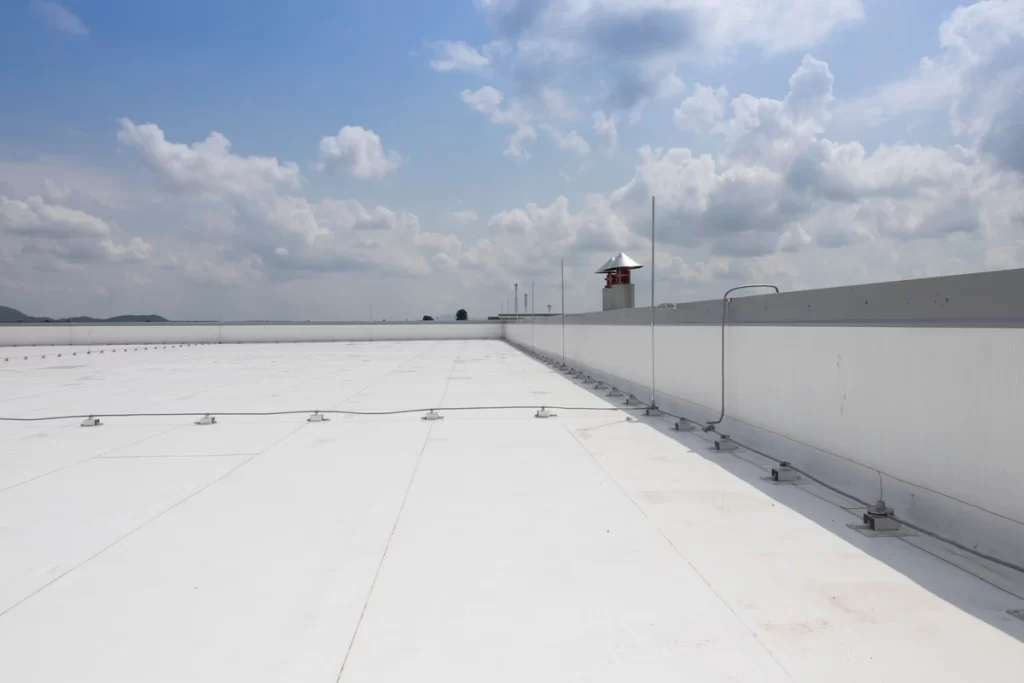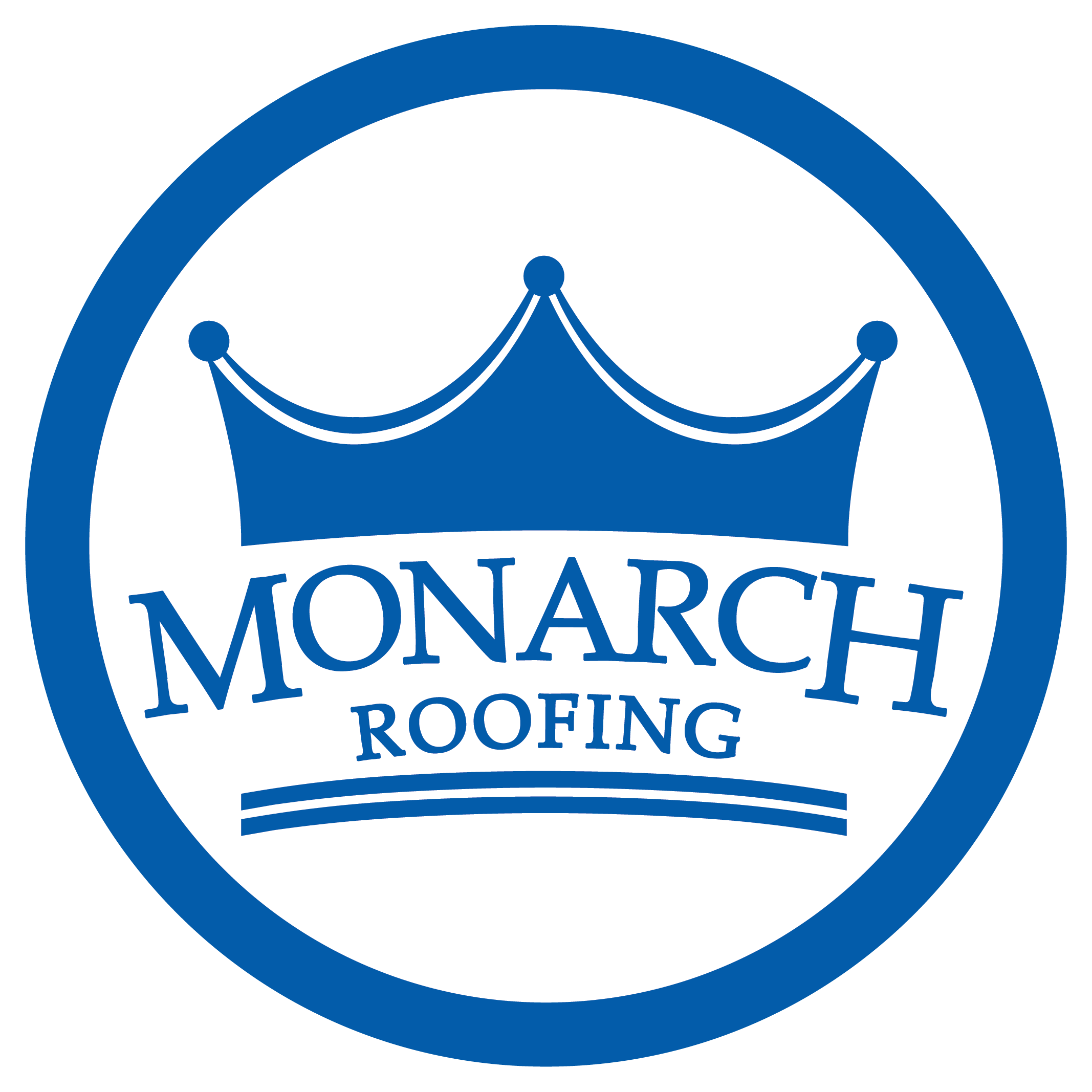In the realm of commercial roofing, choosing the right material is crucial for longevity, durability, and cost-effectiveness. Two popular options for flat roofs are Thermoplastic Olefin (TPO) and Polyvinyl Chloride (PVC) roofing membranes.
But when it comes down to TPO vs. PVC roofing, how do you choose which style is right for you? In this comprehensive guide, we’ll help you understand the nuances of TPO vs PVC roofing, examining:
- Their characteristics
- Pros and cons
- Costs
- Lifespan
- Maintenance requirements
By the end, you’ll be equipped to make an informed decision for your commercial roofing needs.
Understanding Commercial Roofing Materials

Commercial roofing materials differ from residential ones in several key ways. Commercial buildings typically have larger roof spans, requiring materials that offer superior strength and durability to withstand harsh weather conditions and foot traffic. Also, commercial roofs often have unique features like HVAC systems, skylights, and drainage systems that require specialized installation techniques and compatibility with the roofing material.
It’s important to note that commercial buildings are subject to different regulations and codes compared to residential structures, necessitating roofing materials that meet specific fire ratings and environmental standards.
What is TPO Roofing?

TPO roofing is a single-ply membrane made from a blend of polypropylene and ethylene-propylene rubber. It is known for its white reflective surface, which helps reduce energy costs by reflecting sunlight away from the building. TPO roofing is installed using heat welding or adhesives, creating a seamless and watertight membrane.
✅ Pros of TPO Roofing:
- Energy Efficiency: The reflective surface of TPO roofing can lower cooling costs by reducing heat absorption.
- Cost-Effective: TPO roofing is generally less expensive than PVC and other roofing materials, making it an attractive option for budget-conscious projects.
- Environmentally Friendly: TPO is recyclable and can be repurposed into other products, reducing environmental impact.
- Easy Installation: TPO membranes are lightweight and flexible, facilitating quicker and easier installation compared to some other roofing materials.
❌ Cons of TPO Roofing:
- Longevity Concerns: While TPO roofing has improved over the years, some concerns about long-term durability and longevity remain compared to PVC.
- Limited Color Options: TPO roofing primarily comes in white or light colors, limiting design choices for some projects.
- Susceptibility to Punctures: TPO membranes may be prone to punctures from sharp objects or debris, necessitating careful maintenance and inspection.
What is PVC Roofing?

PVC roofing is also a single-ply membrane but is made from polyvinyl chloride, a type of plastic polymer. PVC roofing is known for its durability, chemical resistance, and ability to withstand extreme weather conditions. Like TPO, PVC roofing is installed in a single layer, typically using heat welding techniques.
✅ Pros of PVC Roofing:
- Superior Durability: PVC roofing is highly resistant to chemicals, punctures, and UV radiation, making it a long-lasting option for commercial roofs.
- High Fire Resistance: PVC has excellent fire-retardant properties, meeting stringent fire safety requirements for commercial buildings.
- Wide Range of Colors: PVC roofing is available in a variety of colors, allowing for greater design flexibility and customization.
- Low Maintenance: PVC membranes require minimal maintenance and are easy to clean, reducing long-term upkeep costs.
❌ Cons of PVC Roofing:
- Higher Cost: PVC roofing tends to be more expensive than TPO and other roofing materials upfront, although its longevity can offset this initial investment.
- Environmental Concerns: While PVC roofing is durable, its production process involves the use of chemicals that can be harmful to the environment if not managed properly.
- Heat Sensitivity: PVC roofing may expand and contract with temperature fluctuations, potentially causing seams to weaken over time if not installed correctly.
Cost and Lifespan
When comparing TPO vs PVC roofing, cost and lifespan are important factors to consider. On average, TPO roofing costs between $5 to $8 per square foot for materials and installation, while PVC roofing typically ranges from $7 to $12 per square foot. While TPO may have a lower upfront cost, PVC’s superior durability often results in a longer lifespan, with PVC roofs lasting up to 30 years or more compared to TPO’s average lifespan of 15 to 20 years.
Choosing Between TPO and PVC Roofing
The decision between TPO and PVC roofing ultimately depends on your specific project requirements, budget constraints, and long-term goals. If cost-effectiveness and energy efficiency are paramount, TPO roofing may be the preferred choice. However, if durability, fire resistance, and customization options are higher priorities, PVC roofing may offer greater benefits despite the initial investment.
Maintaining Your Commercial Flat Roof
Proper maintenance is essential for maximizing the lifespan and performance of your commercial flat roof, regardless of whether you choose TPO or PVC. Here are some maintenance tips to keep in mind:
- Regular Inspections: Schedule routine inspections of your roof to identify any signs of damage, leaks, or deterioration.
- Clear Debris: Remove leaves, branches, and other debris from the roof surface to prevent clogging of drains and gutters.
- Seal Cracks and Joints: Repair any cracks or gaps in the roofing membrane promptly to prevent water infiltration.
- Clean Gutters and Drains: Keep gutters and drainage systems clear to ensure proper water flow and prevent ponding on the roof.
- Trim Overhanging Branches: Trim tree branches that hang over the roof to prevent damage from falling debris and reduce the risk of punctures.
Choose the Right Commercial Roofing System for Your Property
In the debate of TPO vs PVC roofing for commercial flat roofs, both materials offer unique advantages and considerations. TPO roofing is praised for its energy efficiency and affordability, while PVC roofing boasts superior durability and customization options. By weighing the pros and cons of each material, considering cost and lifespan factors, and prioritizing maintenance, you can make an informed decision to ensure the longevity and performance of your commercial roof for years to come.
Want to learn more about TPO and PVC membranes?Contact Monarch Roofing to get started!





